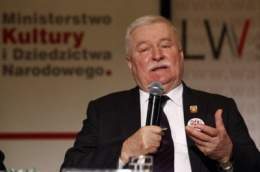. Polish politician , active trade unionist. He was a co-founder of Solidaridad (Solidarność), the first independent union of the communist bloc. He won the Nobel Peace Prize in 1983 , and was President of Poland from 1990 to 1995, succeeded by Aleksander Kwaśniewski.
He has been a great promoter of actions against the Cuban government, and on several occasions he has met with various figures of the counterrevolutionary opposition and representatives of anti-Cuban organizations based in the United States with whom he maintains close relations.

Biographical synthesis
Birth
He was born in Popowo, present-day Poland on September 29, 1943. In 1969 he married Danuta Gołoś, the couple had eight children.
Studies
After completing his primary studies with good marks, between 1959 and 1961 he learned metallurgy, technical drawing and mathematics at a trade school in Lipno, where he specialized as an industrial electrician.
Career path
He works as an electrician at the Lenin Shipyard in Gdansk, but was fired for his participation in the 1976 strikes .
Political career
He was a member of the clandestine trade unions, chaired the inter-company committee and led the workers’ revolt of August 1980 , aimed at the creation of the first free trade union in Poland , Solidarity, of which he was elected president at the First National Solidarity Congress, held in Gdansk of the September 5 to the 7 of October of 1981 after assuming the leadership of the strike committee. It obtained numerous concessions from the authorities, aimed at improving the political and economic conditions of the working class.
However, Moscow put pressure on the local authorities, until, in 1981, martial law was decreed and a Military Junta with full powers, commanded by General Jaruzelski, formerly head of the government, assumed power.
Walesa was arrested and was not released until November 1982 . But the international impact of its activity and its good relationship with Pope John Paul II , also Polish , paid their way to the recognition with the Nobel Peace Prize in 1983 .
By then, the tension in Poland had intensified and led to a state of emergency (which caused the weakening of Solidarity’s combativeness) and an improvement in the regime’s relations with the Church . In November 1987 , General Jaruzelski failed miserably in the popular referendum he had called on economic reforms and the democratization of political life. In view of the failure, the new Prime Minister Rakowski, began negotiations with the opposition, which led to the legalization of Solidarity in April of 1989 .
Presidency
After the victory of the opposition, Mazowiezki presided over a government that led to Jaruzelski’s resignation. In the presidential elections of December of 1990 , Lech Walesa, architect of a peaceful transition to pluralist democracy thanks to the dialogue with the government for the democratization of the regime, won the presidency of Poland , a position which in 1995 was succeeded by Aleksander Kwasniewski .
In his five years as president, the union leader revealed himself as a scheming and maneuverable statesman, who starred in numerous clashes with successive coalition governments, where the personalities and parties that emerged from the union movement were the majority.
Re-election
On June 1, 1994 Walesa announced his decision to run for reelection the following year in the same spirit of containment of the “leftist counterattack” that guided him in 1990, while again appealing to Solidaridad.
Despite declaring himself “completely convinced” of his victory, in the December 1995 elections Walesa lost to the leader of the SLD, Aleksander Kwasniewski: in the first round, on the 5th, he was second with 33.1% of the votes, and in the second and final of the 19 received 48.2%. December 23 is the inauguration of Kwasniewski.
Post presidential period
On April 2 he rejoined the Gdansk shipyard in his usual position, an electrician, although it was more formal than real, since he continued to be active in national politics, multiplying his efforts to bring together the political forces that emerged from the union and participating regularly at events and conferences abroad.
The December to April of 1996 the Sejm passed a law granting former presidents the right to collect a pension from the state, which is host to subvenir your needs.
Titles and awards
Walesa is in possession of a score of honorary doctorates and, apart from those already mentioned, of numerous awards, such as:
- Philadelphia Medal of Freedom (1981).
- Medal of Merit from the Congress of the Polish Community in the United States (1981).
- Free World Award (1982).
- Social Justice Award (1983).
- Council of Europe Human Rights Award (1989).
- Polish Order of the White Eagle (1989).
- International Award for Leadership in Free Trade from the World Association of Chambers of Commerce (1998).
- Czech Order of the White Lion (1999).
Publications
In 1987 he published A path of hope.
